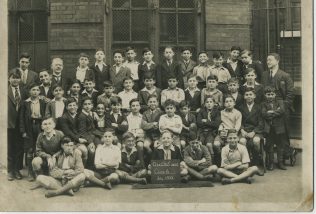Mannie Silver
From Jewish Memories

If you would like to listen to a short section of the interview as you read, please press the play button on the right. If you would like to read the whole interview transcript please follow the download link at the bottom.
EXCERPT:
Title on tape: Mannie Silver, interviewed by Marjorie Monickendam.
Marjorie: This is an interview between Mannie Silver and Marjorie Monnickendam on 31st January 1987. Mannie is my great-uncle by marriage. Mannie, first of all, tell me about your parents. Where did they come from and when did they come to England?
Mannie: They came to England in the early 1890’s and they had a dreadful time in Russia. My mother came from (007 ) but my Father came from Kiev. There were pogroms and the Jews were persecuted unmercifully and they ran for their lives, got on a boat and spent the two weeks coming to England on the deck of the boat. And there was a young baby in her arms and how they managed that I don’t know. When they came to England they landed in the East End of London in the river, in the docks. And they were taken to a shelter in Leman St and there they were kept until they could find somebody to take care of them and to give them a home. Well at the immigration the customs people asked him his name and he said, “my name is Sheret.” They said, “how do you spell it ?”. He says, “Goodness knows, I don’t know how to spell it in English.” However he met a man there who’s name was Goldstein. He said, “look my name is Goldstein. You be Silverstein“, and our name has been Silverstein ever since. There have been one or two slight changes, now we are called “Silver”.
However they found accommodation in (Wentworth St) which is in the heart of the East End of London. It’s so romantic this Wentworth St, its an Aladdins cave of romance and beauty. And the aroma and smell of the food and the vegetables and the cucumber, the pickled cucumbers and the acetylene lamps on these stalls at night-. Today I think it is the most wonderful thing I can remember. However they found accommodation in a pent house, in one of the buildings, for three shillings a week. It was right on the top, eight or nine floors high, and my poor mother trudged up and down these stairs. Today I don’t think they could do it, they haven’t got the guts. These people had terrific courage, they came to England, they didn’t know the language. The first job my father got, I was told, was in a cap-making factory. And he came home with great joy and gave my mother twelve copper coins. They didn’t know the value of it of course. They exploited these poor people that came from other countries.
Marjorie: Were these Jewish people he worked for ?
Mannie: Oh yes, yes of course. And they were all Jewish people in the East End of London, all in the same position as my parents. I was born in 1909 and I was the last of quite a big family and we all lived in two rooms, in this penthouse. And they were so hard up at different times that they even took in a lodger.
Marjorie: Where did the lodger sleep ?
Mannie: On the floor. And they got so used to poverty that they didn’t think anything of it at all. And they all lived happily together and helped each other in one way or another.
Marjorie: So, tell me about your brothers and sisters.
Mannie: My brothers and sisters, because I was the youngest, they were much older than me. And they all found jobs working in hat factories, making millinery hats.
Marjorie: So what language did you speak ?
Mannie: We only spoke Yiddish at home, that was the only language we knew. And as my brothers and sisters, went out in to the world, of course they spoke English and I became bi-lingual. And I still speak perfect Yiddish today.
Marjorie: did you ever speak English so that your parents couldn’t understand you ?
Mannie: We never did that, we only spoke Yiddish to our parents because it was the only language that they could understand. They were very hard-working people. The pathetic thing was that when you walked up the staircase there were aromas from each house. You could smell what they were cooking. And then other places, if you went up a bit later at night, you could smell something much worse. Every room had what we called the red army, we called them the red army- they were bugs. And there were so many, the mattresses were swarming with them, and they couldn’t afford to buy the powder to kill them so they took a candle and went along the mattress, right along the line … and you could smell these damn things. It was horrible. And yet it had some sort of thrilling way about I, I don’t know. And then I must remind myself of this, I have lovely memories of Goulston St- now that was a street just off the side of Wentworth St and at the top of the street was the Brooke Bonds tea factory and next to that was the Goulston Street baths. And for one penny you could have a bath. And being economical I went with my brother to the same bath- because I was a tiddler and he was a big chap. And for three halfpence we had this bath. And if you wanted hot water you shouted “hot water, N0.7 !” or “Cold water No7”. And then you ‘d hear “coming in now, be careful !” And that was really thrilling.





No Comments
Add a comment about this page